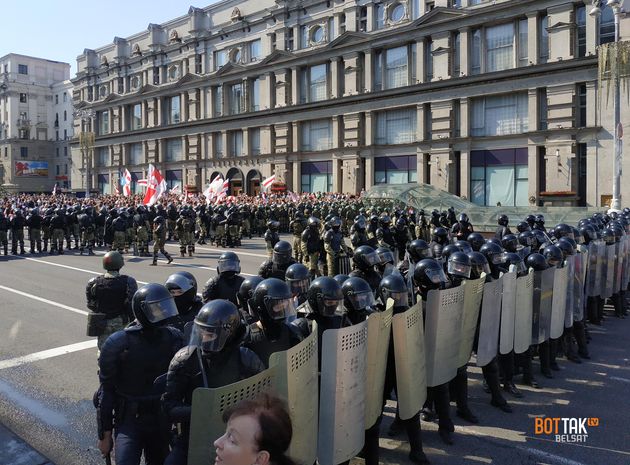At least 100 people were arrested this Sunday. Riot police targeted university students. An opposition leader and ither activists left the country, threatened with prison.
![For the fourth week in a row, tens of thousands of people took the streets of Minsk. / Photo: [link]Belsat TV[/link]](https://cms.evangelicalfocus.com/upload/imagenes/5f562a568b17b_Belar.jpg) For the fourth week in a row, tens of thousands of people took the streets of Minsk. / Photo: [link]Belsat TV[/link]
For the fourth week in a row, tens of thousands of people took the streets of Minsk. / Photo: [link]Belsat TV[/link]
Tens of thousands of people took the streets of Minsk, the capital of Belarus, to protest against President Alexander Lukashenko, for a fourth weekend in a row. There were similar marches in other cities, including Brest, Vitebsk and Grodno.
According to the Viasna non-governmental organisation, there were 130 arrests on Sunday, while Russian news agency Interfax reported at least 100 detentions across the country, citing the Belarusian interior ministry.
Riot police sealed off the centre of Minsk with barriers and armoured personnel. Eyewitnesses said that officers wearing balaclavas arrested and beat several demonstrators. Since the beginning of the protests, at least four people have been killed and hundreds injured, as the government tries to stamp out dissent.
Last week, masked police targeted a school and Minsk’s linguistic university, detaining university students who had returned to start the new school term.
“They talk about the brutality of the Belarusian police, and I want to say this: there are no more humane, restrained and cool-headed police anywhere in the world”, the Internal Affairs Minister Yuri Karayev said speaking to a governmental news agency.
On Saturday, activist Olga Kovalkova left the country and took refuge in Poland, because she has been threatened with a long jail term.
Furthermore, Svetlana Tikhanovskaya, chief opposition to Lukashenko in the election after her husband, Sergei Tikhanovsky, and another candidate were jailed, who was forced to go into exile in Lithuania, urged the UN to send an international monitoring mission to “document the situation on the ground”.
“A nation cannot and should not be hostage to one man's thirst for power. Belarus has woken up, the point of no return is passed”, she pointed out.

Among those arrested and brutally treated were also evangelical Christians, like Tatsiana Belashova, who “was detained for 53 hours” when her husband “had gone into the city centre of Minsk, and disappeared [..] I realised that he had been detained. Special police forces arrested me and other 12 women. As we were woman, we weren’t beaten”, she told Evangelical Focus.
“All the violence suffered by many of us has helped Belarussians to unite”, Belashova said, and asked Christians “pray for the victims. Many have been really injured both physically and emotionally” and to “raise awareness about Belarus outside our country. Try to share information, and say that what is happening in Belarus is not ok”.
Natasha (name changed), another Belarusian Christian who now lives abroad but has family in the country, also encouraged Christians worldwide to “ask our governments that their embassies challenge Lukashenko and demand answers about what is happening in the country”.
“Belarussian people are peaceful and tolerant. Now they are being called to be active and wise”, Natasha underlined in an interview with Evangelical Focus.
Early after the election in August, the Union of Evangelical Christian Baptists in Belarus, the United Church of Christians of Evangelical Faith in Belarus, and the Religious Association of Full Gospel Communities in Belarus (charismatics), released a joint statement calling on “to pray for an end to the violence and bloodshed, and for all those affected and their families”.
They also asked to pray “for those in charge, that they have the fear of God and remember that there is a Supreme Judge over them, whom we will all give an account to [..] and that people will turn through Jesus Christ to God”.

Las opiniones vertidas por nuestros colaboradores se realizan a nivel personal, pudiendo coincidir o no con la postura de la dirección de Protestante Digital.
Si quieres comentar o